Paula Vince's Blog: The Vince Review, page 24
April 26, 2021
'Once Upon a River' by Diane Setterfield
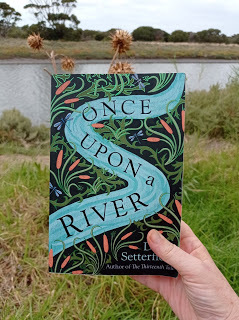
On a dark midwinter’s night in an ancient inn on the river Thames, an extraordinary event takes place. The regulars are telling stories to while away the dark hours, when the door bursts open on a grievously wounded stranger. In his arms is the lifeless body of a small child. Hours later, the girl stirs, takes a breath and returns to life. Is it a miracle? Is it magic? Or can science provide an explanation? These questions have many answers, some of them quite dark indeed.
MY THOUGHTS:
'Just because a thing is impossible, doesn't mean it can't happen.'
This novel is bewitching. It's set along a stretch of the rural Thames in the late 1800s, where people were so steeped in stories, folklore and legend that when something startling really bursts into their lives, they can't figure out whether or not they've been sucked into a story themselves. And even we readers start to wonder when the edges begin to blur.
On winter solstice evening, a battered stranger carries the body of small girl over the threshold of the Swan Inn just before he passes out. Both are soaking wet, apparently having just emerged from the river. The little girl appears to be clearly dead, but then she stirs back to life. She cannot speak a word, but her little frame seems so perfect as to be untouched by any wear and tear of life. And she has an endearing, seductive way of making whoever encounters her long to keep her.
Two strong contenders come forward to claim her. Helena and Anthony Vaughan are a young couple whose toddler was kidnapped two years earlier, and it appears their Amelia has been suddenly and miraculously restored to them. But down the river a little way, Bess and Robert Armstrong suspect the child could be their granddaughter Alice, who they've only just found out about. Circumstances align to make them think she could well be the daughter of their rebel son Robin (who I have to say is a proper little turd). And complicating the issue is the parson's housekeeper Lily White, who's convinced the child must be her long-lost sister Ann.
Elsewhere we have Rita Sunday, the nurse who was called to attend the casualties on the night of their arrival, trying to fit pieces together that refuse to click. And Henry Daunt, the girl's unconscious rescuer, comes to with no idea how he found himself in that situation.
I loved every second of this story, partly for the characters and their impossibly helpless situations, but also for Diane Setterfield's magnificent prose. For example, she describes the plight of the bereft Vaughans this way. 'With their words they were trying to bail themselves out, but their words were eggcups and what they were describing was an ocean of absence too vast to be contained in such modest vessels.'
There's a lot about the power of words, sentences, and eventually the skill of full-blown stories. On one hand, the publican's husband Joe is able to maximise even his facial expressions to make him master of the spoken word. Yet on the other, his teenage son Jonathan cannot master the knack of storytelling, for however hard he tries, he's sure to muddle something. And in the middle are try-hards like Newman the gardener, who discovers that even one misplaced word ruins the whole effect. (For no, you can't hare up the river.) The audience is putty in the hands of a good storyteller, and I know full well Diane is playing us that exact same way.
At the end, she sort of releases us back to our normal lives. 'And now dear reader, the story is over. It is time for you to cross the bridge once more and return to the world you came from. This river, which is and is not the Thames, must continue flowing without you. You have haunted here long enough, and besides, surely you have rivers of your own to attend to.'
The thing is, we've been so immersed I'm not sure I want to go back yet. I can still smell the murky river bank, and feel the spray on my face.
🌟🌟🌟🌟🌟
April 19, 2021
'Work' by Louisa May Alcott
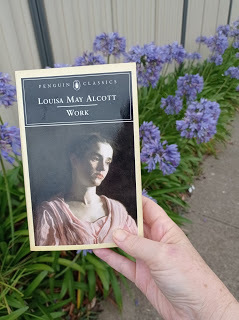
In this story of a woman's search for a meaningful life, Alcott moves outside the family setting of her best known works. Originally published in 1872, Work is both an exploration of Alcott's personal conflicts and a social critique, examining women's independence, the moral significance of labor, and the goals to which a woman can aspire. Influenced by Transcendentalism and by the women's rights movement, it affirms the possibility of a feminized utopian society.
MY THOUGHTS:
I'd never heard of this book until I bought it at a second hand shop recently. That's why I'm choosing it as a book by a favourite author I've never read in this year's Back to the Classics Challenge. It seems that in a sober mood, Louisa May Alcott decided to write this story for adult readers rather than children and youth, which I took as a clue that I should prepare myself for plenty of frank, reflective passages.
Basically, we get a glimpse into the job seeking maze of the nineteenth century.
It's about a young woman named Christie Devon, who was an orphan living with her mother's brother. She suspects that Uncle Enos isn't thrilled about having her there and decides to strike out on her own to find work. Christie feels sensitive about wearing out her welcome and also sees only 'bad marriage, sour spinsterhood or suicide' before her if she stays. That's a pretty bleak attitude for a 21-year-old, but gives her a sort of gloomy optimism that however she fares in the wider world could be no worse than staying. This poor girl is knocked around by the world at large, but something about her quiet, steady and modest soul reminds me of Jane Eyre.
The first several chapters are named after different occupations, as Christie tries her hand at each of them and feels compelled to move on, for a series of legitimate reasons. (Servant, Actress, Governess, Companion, Seamstress, and so on.) The format reminds me a bit of those feel-good tales where young heroes try many alternatives before returning to where they started, convinced now it was the best. However, this is anything but that! Retreating home is not an option here, as Christie has burnt her bridges where Uncle Enos is concerned. She'll never go back.
There is a romantic thread, in the form of two contenders for her heart. First is Philip Fletcher, the brother of one of her employers, whose sole aim is to be a dilettante and kill time. That is, until he's inspired by Christie's fine nature. The second is David Sterling, the son of another employer, who is nursing some mysterious heartache of his own and devotes himself to his floristry business and a quiet life. (This guy may or may not have similarities to Alcott's family friend, Henry David Thoreau, but maybe it's just the name.)
This tale has a desperate, raw quality which never makes it into Alcott's juvenile fiction. Christie's world sometimes seems shrouded in darkness and the heavens seem like iron. 'What have I ever done to be so desolate and miserable, never to find any happiness however hard I try to do what seems my duty?' She even contemplates suicide and has to be drawn back from the brink. The old-timers from the nineteenth century surely knew about hardship, struggle and grief, so I read it with a sense that it behooves us to listen to them. There's always a feeling that when Alcott writes Christie back to mental and physical health, we'd do well to latch onto any solution she suggests.
And there are plenty to choose from. I found myself copying several quotes, but for the sake of staying fairly brief, I'll just give one of my favourites. It's this exchange between Christie and David.
Christie: You said you'd learned to feign happiness. I wish you would tell me how you do it, for it is such an excellent imitation, I shall be quite content with it til I can learn the genuine thing.
David: I did not love my work, but it was good for me and helped cure my sick soul. I never guessed why I felt better but dug on with indifference at first, then felt pride in my garden, then interest in the plants I tended, and by and by I saw what they had done for me and loved them like true friends. If I keep tugging, I may yet be the cheerful, contented man I seem.
Yeah, I dig that. David Sterling predates the maxim, 'Fake it til you make it,' but he sure enters into the spirit of it.
It's a very simple, yet profound story that stays in your mind. Sometimes it's pretty shocking, such as when the Civil War rocks the nation, and Christie's pious mentor Mrs Wilkins pays out her poor husband for hesitating to enlist and put himself in the firing line. She tells their 10-year-old son, 'I wish I could add ten years to your age and send you off to fight for your country like a man!' and then nags the dad until he caves in. I have to assume this sort of blind, fanatical fervour is Louisa's own, and it leaves a sour taste in my mouth. But she was an author who sure could pick up a pen for a cause.
I'll finish with another convicting speech, this time from Christie's friend Rachel, an ex-prostitute who faces a group of judgmental fellow seamstresses, who used to be her friends and now wish to fling her out on her ear.
'It's no use for such as me to try. Better go back to the old life, for there are kinder hearts among the sinners than the saints and no one can live without a bit of love. Your piety isn't worth much, for though you read in your Bible how the Lord treated a poor soul like me, yet when I stretch out my hand to you for help, not one of all you virtuous Christian women dare take it and keep me from a life that's worse than hell.'
Bravo! On the whole, this book is definitely no barrel of fun. But it's one I'll still recommend. And might even dip into again down the track.
🌟🌟🌟½
April 11, 2021
Do you review books with your head or your heart?

I once shared this post about the star ranking system.
I realised that I award stars based on pure engagement. In other words, I'm sure I lead with my heart. If I love the characters, jot down plenty of inspiring quotes, feel wiser or happier for having read a book, or can't wait to incorporate the story into my imaginary thought life, then it gets five stars. Does that sound like a tall order though? Let me assure you that since I like to be swept away to another world, I'm willing to potentially award five stars whenever I pick up a new book. I want to distribute as many fives as possible, and no book has to be perfect to tick those boxes.
Some other reviewers lead with their heads, and I'm sure getting five stars from these folk is a taller order than getting them from me. They tick off technicalities such as structure, grammar, story arc, showing without telling, tightness of diction and presence of symbolism. They want themes to be full of beauty without being in our faces. Some even go full-on Joseph Campbell and insist the hero's journey must be evident each step of the way. Dialogue must come across natural without being inflated with unnecessary words (which really are, in fact, natural). And a book has to stand the test of political correctness too, which means that the fives of one era might become the ones of another. These head-led reviewers are the people you might hear saying, 'I very rarely give fives.' Based on their criteria, this makes perfect sense. From such a reviewer, a four-star ranking is cause of great celebration.
I'm actually pleased to consider myself a heart-reviewer. This way you get to be generous and give top marks even when the editing isn't flawless or the literary excellence leaves a bit to be desired. But there is a flip side. It follows that heart-reviewers might feel inclined to dole out ones or twos based purely on emotional responses too. Any given book may flow with technical perfection, read like a work of fine art and be top of the charts for years, yet if the characters annoy us with dumb decisions and stinking attitudes, or the plots make us fume, we'll be the dark horses who give unexpectedly tough feedback.
In an ideal world, I believe there should always be a written review to support exactly why a reader fixed on a specific number of stars. Do you know what presses my buttons? Readers who merrily leave a wake of one or two star rankings on Goodreads without bothering to leave a single word as to why. Explaining your decision can be a lot of fun. I love describing why a five-star book has touched me deeply. And I equally enjoy the challenge of justifying a two-star ranking in such a way that I'm not being super-mean but still making a fair point.
As for one-star rankings, I rarely give them. For me, it means, 'Pity a poor tree had to die for this,' which is a pretty blunt assessment of some writer's hard work. I'm a DNF-er these days, so if some book is shaping up to be a one-star story, I'll be more likely to leave it unfinished. But once again, it all comes back to the heart. If it strikes me that an author's dodgy values, disrespect for others, questionable philosophy, narrow-mindedness or tacky flippancy are obnoxious enough to deserve it, I just might give one star.
Occasionally there is the type of material that doesn't deserve to be politely ignored.
Do you review with your head or with your heart?
April 4, 2021
'The Horse and his Boy' by C. S. Lewis
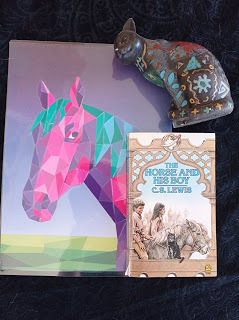
Or 'The One with the Great Journey.'
There are a few spoilers in my discussions below the line, so beware.
I'm chalking this one up for both my Narnia Business and also my choice for Travel or Adventure Classic in this year's Back to the Classics Challenge. Reading it reminds me that this may well be my favourite of the whole Narnia series. It's a tale within a tale, occurring some time during the long and successful reign of the Pevensie kids in Narnia.
Shasta is a fisherman's son who suddenly discovers he's not a fisherman's son after all. On the verge of being sold to a tyrannical master by the man he believed to be his father, he escapes with the man's horse, Bree, who happens to be a talking Narnian steed. They intend to make a dash for freedom from harsh Calormen in the south to glorious Narnia in the north, and Bree has been a prisoner for so long, he barely remembers his roots. On their way they join forces with another pair heading in the same direction. Aravis is a girl of noble birth trying to dodge an appalling arranged marriage, and her gentle mare, Hwin, is another talking horse from Narnia.
Before they make it, there are many dangers to dodge and unexpected evil plots to unmask. Rather than the personal quest it started as, the whole journey turns into a desperate rush to save a country.
Things I appreciated more than before
1) Shasta and his pity-party. This boy gets me nodding with complete sympathy and understanding when he's carried away on tidal waves of self-pity while he convinces himself he's an underdog and victim, born under an unlucky star. When we start thinking in this manner, more reasons to reinforce our outlook keep coming thick and fast. Don't we all know it? But I love how Aslan tears apart Shasta's morbid reasoning with tremendous love and kindness, and without adding fuel to the fire by false sympathy.
2) Bree and his pride. This horse's life experiences make him extremely smug, and being taken down a peg or two is a great turn of events for us readers, though very confronting for him. Through Bree we see that taking a good, hard look at ourselves with honest appraisal is healthy for our self-esteem, instead of detrimental as some modern pop psychology might have us believe. We're all the heroes of our own stories and it's easy to delude ourselves that we're pretty perfect, so I think Bree learns one of the best lessons of the entire series.
3) Aravis and her lion attack. Wow, what an eye-opener for this princess! I'm glad she found out why it had to happen, because I was wondering too. Sometimes our lessons really hurt.
4) Hwin and her unassuming modesty. The gentle mare is a great example for any readers who find ourselves easily cowed by stronger personalities. I notice she's not told to stand up for herself in future, because it's just not in some natures to be confrontational. But I think she's armed with tools to help her not back down in her own mind.
5) The middle-eastern description of the great Calormen capital city of Tashbaan. It reminds me of ancient Babylon, or somewhere from The Arabian Nights.
6) Shasta's creepy experience alone at the Tombs of the Kings, near the start of the desert. Especially the appearance of the comforting cat who helped him fall asleep.
7) Aslan's revelations to the little company of travellers. By the time he finishes with the horses and children, they've learned that great strokes of blessing or destiny may be disguised as hard luck. It's not entirely a provable analogy for real life, but surely enough people have indicated by hindsight that it can be true. Not to mention Aslan's insistence that nobody should be nosy about anyone else's story but their own.
What I wasn't a fan of this time round.
1) The archaic and rigid rules of succession in Archenland. Something as arbitrary as birth order determines every significant decision for a nation, including who should inherit the right to rule the land. Sure, the characters believe this isn't capricious at all but predetermined by destiny. But from our vantage point, it appears that a physically adventurous and thoroughly capable lad who's been groomed from infancy to take his royal place must step aside for a green newcomer who knows absolutely nothing and is loath to take on the responsibility anyway. That's crazy in anyone's books.
Conveniently, Lewis wrote the story in such a way that Prince Corin is delighted not to have kingship looming over his future. But had it been otherwise, he could have made Shasta's life very unpleasant. And having been relegated to second place because he followed his brother into the world a mere twenty minutes later, I think Corin would have had a strong case for being annoyed.
Some Great Quotes
Bree: Now we've got to have reins for the look of the thing, but you won't be using them.
Narrator: In Calormen, storytelling is a thing you're taught, just as English boys and girls are taught essay-writing. The difference is that people want to hear the stories, whereas I never heard of anyone who wanted to read the essays.
Lasaraleen (Aravis' friend): Anyone I catch talking about this young lady will first be beaten to death and then burned alive, and after that be kept on bread and water for six weeks. There.
Narrator: One of the drawbacks about adventures is that when you come to the most beautiful places, you are often too anxious and hurried to appreciate them.
Narrator: Both horses were doing if not all they could, at least all they thought they could, which is not quite the same thing.
Hermit of the Southern March (to Bree): You are not quite the great horse you had come to think, from living among poor, dumb horses. Of course you were braver and cleverer than them. You could hardly help being that. It doesn't follow that you'll be anyone very special in Narnia. But as long as you know you're nobody very special, you'll be a very decent sort of Horse, on the whole.
Bree: Aslan, I'm afraid I must be rather a fool.
Aslan: Happy the horse who knows that while he is still young. Or the human either.
Stick around, because next up will be Prince Caspian.
March 29, 2021
'Boy Swallows Universe' by Trent Dalton
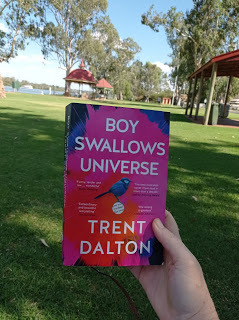
A novel of love, crime, magic, fate and coming of age, set in Brisbane's violent working class suburban fringe - from one of Australia's most exciting new writers.
Brisbane, 1983: A lost father, a mute brother, a mum in jail, a heroin dealer for a stepfather and a notorious crime for a babysitter. It's not as if Eli's life isn't complicated enough already. He's just trying to follow his heart, learning what it takes to be a good man, but life just keeps throwing obstacles in the way - not least of which is Tytus Broz, legendary Brisbane drug dealer.
MY THOUGHTS:
Oh wow, it's a rare sort of story that makes me want to jump out of my seat and fist pump the air even once, and this one caused that reaction several times. Trent Dalton just keeps upping the intensity of those triumphant moments.
Perhaps the fact that I was a similar age to the hero Eli Bell; a young teen in the mid eighties Aussie suburbia, has something to do with it. Although my background is nothing like Eli's (thank heavens!), the nostalgia of time and place is still thick enough to rewind my mind instantly back to those rough old years between 1985 and 1991.
The back cover blurb tells all a reader really needs to know. Eli's stepfather Lyle is a heroine dealer, his mother Frances is an ex-junkie and his babysitter, Slim Halliday, is a noteworthy ex-jailbird with a Houdini reputation. Eli hasn't seen his biological father, Robert Bell, for many years, but there's a good reason for that, as Robert endangered the lives of his baby sons. Surrounded by all these examples of misplaced passion, Eli still aims to be a 'good man', although he knows he has only the guiding light of his own conscience and intuition to figure out what that even means.
This is essentially a bildungsroman, or growing up story, taking him from the age of 12 to 19. Pondering the twists and turns his life takes shows Eli that there are often strong veins of good to be mined in the soil of apparently bad lives.
Equally lovable but more mysterious than Eli himself is his selectively mute brother August, who can talk perfectly well but chooses not to. The face August shows the world is that of a young eccentric, but those who know him realise there are reservoirs of deep knowledge in his nature which he's unwilling to share for fear of being misunderstood. August decides from a young age that it's safest to shut up completely. He's a fascinating example of a hero who's learned to be content with his own rich inner life from an early age, and offers a sense of faith and stillness to every scene he's in.
By contrast, Eli is a probing boy, an aspiring young reporter who longs for answers, but discovers that sometimes the ones he seeks are not worth discovering. Or in other words, he's asking the wrong questions. We get to share some nuggets of wisdom Slim teaches the boys, won by hard experience. The best way to maximise our time on earth is to savour every detail of our daily minutiae. Something as subtle as the sense of smell is a container of deep meaning. Or from their dad, Robert Bell, sometimes you have to choose things that are good over the things that are easy.
This gave me a book hangover. I wanted more of gutsy, reactive Eli and peaceful, enigmatic August. There's some fast paced action, some entertaining romance, a truly corrupt villain, and just enough strange magical realism stuff to show it's an unfathomable world out there. (Any theories about the red telephone, anyone?) Overall, Eli has just the perfect combination of compassion and originality to make him do some crazy things from the goodness of his heart, and what more can we ask for in a hero? I'll be looking out for Trent Dalton's other novels for sure.
🌟🌟🌟🌟🌟
March 24, 2021
Great wisdom from fictional clergy
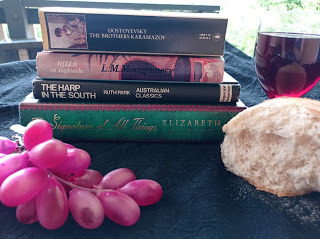
Many of our favourite classics of the western world are full of Christian ministers from all sorts of denominations. And heaven knows, the clergy of celebrated fiction are an odd bunch who say all sorts of outrageous nonsense. Look no further than Jane Austen's obnoxious parsons or Charlotte Bronte's ridiculous curates or Barbara Kingsolver's condemnatory, misguided Reverend Price. Then there's the likes of the rigid, destructive Father Reynaud from Joanne Harris' Chocolat. Since so many crooked ministers pop up in the world of literature, it's well worth chalking up a hallelujah whenever a good one raises his head!
Here's a short list of clergy from classics or bestsellers with genuinely sound or thought-provoking wisdom for us to take on board.
1) Father Jean Latour (from Death Comes for the Archbishop).
Where there is great love, there is always miracles.
This young man has a fascinating grasp on the nature of divine encounters. He and his best friend, Father Joseph Vaillant, are walking along discussing 'thin places' such as Lourdes, where astounding miracles seem to happen on a regular basis. Father Joseph wistfully comments that he wishes he could visit one, to which Father Jean has a decisive reply.
'Where there is great love, there is always miracles. One might almost say that an apparition is human vision cemented by divine love. The miracle of the church seems to me to rest not so much upon faces or voices of healing power coming suddenly near to us from afar off, but upon our perceptions being made finer, so that for a moment our eyes can see and our ears can hear what is there about us always.'
I love his conviction that a veil simply exists between our everyday lives and a wonderful realm beyond our five sense which is not really as mind-blowing as we may imagine. Not to mention his insinuation than any place has the potential to be as holy as any other. Well spoken, Father Jean.
2) Reverend John Knox Meredith (from the Anne Series by L.M. Montgomery).
God is infinitely little as well as infinitely big.
During the grim WW1 era of Rilla of Ingleside, Reverend Meredith discusses the mystery of divine protection with Miss Gertrude Oliver. Gertrude mentions her suspicion that the carnage of fallen soldiers and their grieving loved ones may make no more impression on the Almighty than the toppling of an ant hill does on us. Reverend John has a ready reply.
'You forget that an infinite power must be infinitely little as well as infinitely great. We are neither, therefore there are things too little as well as too great for us to apprehend. To the Infinitely Little, an ant is of as much importance as a mastodon.'
Three cheers, Reverend John! He's so staunch in his faith that the God who knows each hair on our heads, or when a sparrow falls, has the tiniest things in his sight, and they are no way as significant (or insignificant) as we may assume them to be. Including ourselves.
3) Reverend Francis Welles (from The Signature of All Things).
The miracle is in my own head.
This diminutive minister serves a congregation of native Tahitians who put him through his paces, because they keep demanding observable, in-your-face miracles which he (and by extension his God) cannot deliver. Reverend Welles believes that he can offer them nothing but the miracle which occurred in his own head. He used to be a wild reprobate but now professes to know deep in his heart that without God's saving grace, he'd be a wretch. He can't blame the Tahitians for not feeling that's a sufficient miracle, for they have no access to the hugely contrasting states of his heart before and after. Here is what Reverend Francis tells the main character, Alma Whittaker.
'I can scarcely fault them for they cannot see into my heart. They cannot see the darkness that was once there, nor can they see what has replaced it. But to this day, it is the only miracle I have to offer, and you see, it is a humble one.'
But no less of a miracle for all that. This man is a self-sacrificing hero all through the novel.
4) Father Zossima (from The Brothers Karamazov).
The butterfly effects extends from 19th century Russia to us.
A huge chunk of this brick-thick classic is chock full of this man's homilies, and to young Alyosha Karamazov, Fr Zossima is a hero, saint and worthy role model. Therefore it's well worth choosing one of his many contributions for this list.
Zossima exhorts his listeners to be loving and inoffensive to children, which includes making sure that our own appearance is pleasant and seemly. To those who think these two things seem to have no connection one to the other, Zossima has this to say.
'You pass by a little child, you pass by spitefully with foul language and a wrathful heart; you may not have noticed the child, but he has seen you. And your face, ugly and profane, will perhaps remain in his defenceless heart. You may not know it, but you have perhaps sown an evil seed in him and it may grow, and all because you did not exercise sufficient care before a child, because you did not foster in yourself a discreet, active love.'
Father Zossima goes on to explain that this matters greatly, because everything in the world is connected. The impression you and I leave on random kids we pass may have more far-reaching repercussions in the world out there than we might ever imagine. Dismissing any moment as transient and unimportant is shortsighted on our part, so we should always present our best face to the world.
5) Sister Beatrix (from The Harp in the South).
God has his own ways of giving us experience.
She is standing in as proxy for Father Cooley, but the solemn and austere nun who has always made the Darcy sisters a trifle nervous says exactly the right thing at the right time. Rowena Darcy is a young woman who has undergone a traumatic experience from which she struggles to recover physically and emotionally. She has been beaten by thugs and lost the baby she carried. There's a flurry of anxiety in the Darcy household when Sisters Beatrix and Theophilus are on their way. They half expect disapproval, but Sister Beatrix has this to say.
'God has his own ways of giving us experience, Rowena. Don't regret all the pain you have suffered. You will learn in the long run that it gave you wisdom or strength. Lift up your heart, as Father says in the mass, and be glad that God thought you worthy to go through this trial for his sake and your own.'
Somehow, everything seems transformed once she's departed, and they learn to look at hardship through a lens of not being wasted.
Those are five favourite incidents that spring to my mind, and I'm hoping that including them all together in the one spot may impart something of the same wow factor I got out of them individually. If any of you can think of any other admirable fictional clergy whose words and presence have affected you the pages, I'd love you to share.
March 17, 2021
'A Little Princess' by Frances Hodgson Burnett
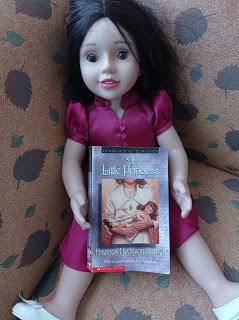
Sara Crewe, an exceptionally intelligent and imaginative student at Miss Minchin's Select Seminary for Young Ladies, is devastated when her adored, indulgent father dies. Now penniless and banished to a room in the attic, Sara is demeaned, abused, and forced to work as a servant. How this resourceful girl's fortunes change again is at the center of A Little Princess, one of the best-loved stories in all of children's literature.
MY THOUGHTS:
This is a charming riches to rags to riches tale, and a clarion call to kindness. The genre is kids' feel-good story that verges into horror for me. I'll explain why below.
The little heroine, Sara Crewe, is not a real princess but the daughter of a doting young dad whose chief love language seems to be gifts, which he showers on her. He enrolls her as a pupil at Miss Minchin's Seminary for girls, and ensures she has her own lavish sitting room, extensive wardrobe and wonderful dolls. Down the track, when he dies overseas, having lost all his money on a bad investment, Sara is demoted in a flash from most pampered pupil to general drudge. She really has to start relying on her endearing mental coping tools, such as pretending she's a real princess, to get through each exhausting day.
At first I found the story hard to swallow because the main character is presented as so perfect. Even E.L. Koninburg, who wrote the foreword of my edition, thought Sara was insufferable at the start. Who wants to read about a seven-year-old know-it-all? Yet when she becomes an underdog, alone in the world without a soul to turn to, we start caring what happens to her. I found Sara's personality growing on me.
The book was published in 1905, so it's early Edwardian with plenty of lingering Victorian harshness. The setting is the storybook London we all enjoy reading about but would hate to live in. The era was horrendous for those deemed to be nobodies. It's disgusting that Becky, the young scullery maid, should remain undernourished unless Sara sneaked some food to her. Miss Minchin owed to her live-in employees to feed them well, but obviously didn't see it that way. And there were no trade unions or fair work tribunals to turn to.
Sadly, personal status has little do with conduct and industry and everything to do with financial bounty. Sara #1, the little heiress, is admired far and wide. Yet Sara #2, the servant in rags, is largely invisible. Yet she's the same person. Kudos to Frances Hodgson Burnett, for actually living in the era and writing a book to expose these stinking double standards.
The kindness theme is wonderful. It's so moving when Sara is the recipient, especially when her benefactors make it clear that their clandestine generosity fills their days with interest and meaning, whereas they used to drag on wearily. Kindness is its own reward. (Toward the end, I love how Sara eventually starts what could be seen as a precursor of a modern non-profit organisation.)
But do you want to know what makes it a horror story to me? It's the fact that Captain Crewe latches onto Miss Minchin's Seminary through a recommendation. His friend, Lady Meredith, was impressed enough with the place to pass on the prospectus. So the young captain takes his precious daughter to the dwelling of a monster, convinced he's making the best move. People like Miss Minchin are still at large, pulling the wool over the eyes of supposedly trustworthy friends. So another main theme, which Hodgson Burnett might not have even intended to add, is this. You can't trust well-meaning recommendations. It would make life easier if we could, but friends, we owe it to ourselves and our loved ones to go the extra mile and do our homework. That's what I get out of this story.
But on the whole, Sara becomes inspirational to us as a result of being inspired herself. She's the little girl who faces each day by imagining she's a princess incognito or a prisoner in the Bastille. In turn, readers having a crummy week at school or work may inspire ourselves by remembering how Sara Crewe remembered those noble Bastille prisoners. It really is a ripple effect.
Oh, and Melchisidec the rat is very cool. Some of the best stories have animal characters. It's a tip good authors seem to know.
🌟🌟🌟🌟½
March 7, 2021
My Precious

One night I retreated to a bubble bath with two books; a non-fiction and fiction, intending to read a chapter of each.
The non-fiction book discusses the very real 21st century problem of social media addiction, and how our mobile phones that facilitate it any time of the day become more essential to our state of mind than we'd ever imagine. It delivers evidence that this is actually similar to cocaine or sugar addiction, giving us feel-good dopamine fixes from instant approval whenever we check our likes or comments, and setting us up to check more frequently for the same pleasurable rush. We snatch up our phones the instant we hear a notification, then suffer because the constant fragmented attention from interrupting whatever we were doing is actually dumbing us down.
The book presents evidence that it takes almost half an hour to recover our concentration from such diversions, small and pleasurable as they may seem. We're too scattered to give books and articles the attention they deserve. We may be getting validation fixes, but they come at the cost of our cognitive capacity, for we were never meant to multi-task. In short, our egos may be purring but our IQs are being whittled down. And we get jittery and uneasy whenever we're separated from our phones for any length of time.
Whew, that wasn't news to me, because I've heard other people saying the same thing. My youngest son has just spent a lot time working on this very topic for his Year 11 Personal Project, and I proofread his work. Interesting, but sobering. It was time to move on to the fiction.
I'm re-reading bits of The Lord of the Rings after many years, and was up to the part early on when Gandalf the wizard arrives to tell Frodo Baggins that the Ring he'd inherited from his elderly relative Bilbo actually has a greater hold on him than anyone had imagined. It was the Dark Lord's own powerful ring, and anyone who possesses it, including Bilbo and its former owner Gollum, becomes supernaturally clingy and loathe to part with it. The Ring has a sinister influence of its own, and enabling its wearer to become invisible is just the start. If the owner doesn't take special care to use it sparingly or not at all, it erodes their personality and diminishes their personhood. The pathetic Gollum is a prime example.
Well, although I'd intended to change focus, I couldn't help noticing the unsettling similarity between the content in my two books. Was it a sign to consider my own relationship to my phone perhaps?
Like many other introverts, I'm a huge fan of our social media era. It's wonderfully opened up ways for the quietest among us to use our voices. I have some friendships based entirely on Instagram or blog feed, which are equally satisfying as other IRL relationships. Written encouragement is easier stored for future reference than impromptu chatter, so I'll never shut down my social media accounts or go full-on Chicken Little, madly deleting apps, as I've noticed some people doing. That seems to be really throwing out the baby with the bathwater.
But it behooves us to be aware of those subtle menaces to our brains and personalities if we don't use our phones and accounts thoughtfully. You won't find me joining, 'The phone is the enemy' crowd. I'm not into quests to throw it down the Cracks of Doom or anything that extreme, but I'm willing to make these concessions.
a) Put the phone away for long stretches at a time. If we are in another room and don't hear the merry tinkle of notifications, there are no urges to resist. I may even choose to leave it home sometimes, although I'm well aware it also contains my camera, time device and contact ability. These are other things we didn't seem to need to have on hand 24/7 in days gone by. (Update: And of course we now need them to scan QR codes at shops and businesses. Can't escape the way the 21st century is drifting us.)
b) Put a timer on, when it comes to soothing scrolling through Facebook or Instagram. If we purposely limit it to 30 or 45 minute blocks once or twice a day, we won't accidentally join the average of what I've read is 4 hours a day. (Whoa, what a phenomenal amount of time for doing essentially nothing!)
c) Be intentional about exercising my concentration muscles by deep reading of books and articles rather than skimming. I'm trying to get out of the habit of skimming my eye down an article to gauge whether or not it'll be relevant, then returning to the top if I decide the answer is yes. My aim is to save time, yet instead it just makes me a shallow skimmer consuming a lot of material in the same time I could read one decent article with full concentration. Do you have the same tendency? Did you give in the urge to skim this blog post? Haha, be honest, or you're only fooling yourself.
d) Take the perfectly curated, breathtaking posts and images of others with a grain of salt. I've observed others enough to know how much time and care it takes to set up those apparently impromptu shots. It's not my talent, so I'll stick to being genuinely impromptu, especially since I know the few seconds others take to admire is wildly disproportionate to the time it takes.
How about you? Have you had a go at battling this devious monster?
February 28, 2021
'The Lion, the Witch and the Wardrobe' by C. S. Lewis
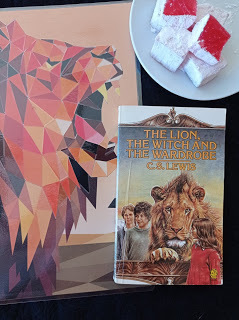
Or 'The One with the Turkish Delight'
Caution: There'll be spoilers in a readalong such as this.
I think most of us have a fair idea how this one goes. It is the most iconic book of the series.
To escape air raids in London, four brothers and sisters, Peter, Susan, Edmund and Lucy, are sent to stay in an old country mansion owned by Professor Kirke. Lucy, the youngest, is first to discover that the back of an antique wardrobe leads to a snowy world where it's always winter. Edmund, the next youngest, has an encounter with the wicked witch who usurps the leadership of the land. And finally all four learn how their arrival is woven into a prophecy, and meet Aslan, the majestic Lion of Narnia. He's the only one who can destroy the witch's plan to harm them, and the tale of how he does it is timeless.
What I appreciated even more than before.
1) It's easy to agree to a plan of action in theory, which your principles won't let you carry out in practice. Just ask Mr Tumnus. He successfully seduces Lucy with cosy afternoon tea, cool stories and enchanted flute music, intending to detain her for the Queen. But when the crunch comes, he's a good guy who is guided by his conscience, even when that seems to lead him into very hot water. Good on you, Tumnus.
2) We're introduced to Professor Kirke, an old man with shaggy white hair all over his face. It's our old friend Digory! I never noticed as a kid, but he essentially talks Peter and Susan through C. S. Lewis' own pet theological trilemma; Lunatic, Liar or Lord. In this case, the topic is whether or not to believe Lucy's claim that she's visited a strange land through the back of the wardrobe. The professor explains that if it's not true, she'd have to be either bonkers or untruthful, and Lucy clearly isn't either. (Well, good old Digory ought to know, since he was the boy who unleashed the witch in Narnia in the first place. But we won't find him owning up to that.)
2) Dirt tends to stick, once a person has a bad reputation. Even though Edmund redeems himself mightily and has the presence of mind to target the witch's Achilles heel, he'll still always be known as the boy who betrayed his siblings for a chance to pig out on Turkish Delight. (I've focused more on Edmund in this list of Bad Boys with Depth. I won't repeat it all here, suffice to say that his family position as third born was unfortunate for him, and his taunting of Lucy was all about trying to raise his own status.)
3) Edmund isn't the greedy guts some readers may think. That Turkish Delight was enchanted, which compelled him to keep wanting more. I imagine Edmund to behave like an addict who craves a fix. Any addictive substance is a personality changer, and as we know, he was already a brat with hang-ups to begin with. Edmund was really in no position to break free from the pull of such powerful magic. He genuinely convinced himself that the witch wouldn't harm his brother and sisters. Wishful thinking is a mighty persuasive tool, and coupled with the powerful enchantment of the bad sweet, he would have needed super-human strength to resist the trap she'd set for him. I've always been in favour of cutting Edmund some slack. In the grand scope of Lewis' Christian allegory, he represents each of us, after all. There's no sense in coming down hard on him.
4) Having said that, my intention is not to excuse him. Understanding and empathising with a person is way different to condoning what he did. A traitor is a traitor. If somebody unleashes a trail of damage or harm, it can't be undone. Aslan knew that. And Edmund certainly knew it himself.
5) The witch chooses a reign of terror as her preferred method of being monarch. When somebody who so clearly prefers the stick method suddenly chooses to use the carrot, alarm bells should be ringing. Had Edmund known her any better, he might have been wiser. Anybody who has proven they have no warmth or kindness in their heart must have an ulterior motive when they decide it's worth faking.
6) The description of the witch's rabble of followers is frightful. Whenever I hear philosophies abound that evil doesn't really exist, I imagine scenes such as this. Lewis lists off Ogres, Spirits of evil trees and poisonous plants, Cruels, Hags, Incubuses, Wraiths, Horrors, Efreets, Sprites, Orknies, Wooses and Ettins. These are Queen Jadis' buddies. He adds, 'and other creatures I won't describe because if I did the grown-ups would probably not let you read this book.' Whoa, I wonder how many adult readers' imaginations may rush to fill in the gaps! One of the pivotal points of the series occurs when these degenerate, despicable beings hold their celebration of triumph as the noble Aslan quietly and gracefully offers up his life on the Stone Table.
7) Mr and Mrs Beaver. What a great pair of helpers.
What I wasn't a fan of this time round.
1) I wouldn't have minded hearing at least a little of what Aslan had to say to Edmund, when the two met up for the first time. The boy clearly had issues and I'll bet the conversation might have hit the spot for readers with similar hang-ups and errors of judgement in their past. But all we're told is that it took quite a long time and made a deep impression on Edmund. Yeah, I'll bet it did, on both counts. So since we've been keeping Edmund company throughout most of his stinking thinking, why not now?
2) Father Christmas tells Susan and Lucy that they'll have to stay out of battles. Susan is to use her brilliant new bow and arrows only when strictly necessary. He says, 'battles are ugly when women fight.' Ahem, that's debatable, Father Christmas. The Witch is a female after all, and she's the most formidable tyrant Narnia has ever faced. History is full of bad-ass women who can kick butts big time. Surely I'm not the only reader to think that the more willing hands on board the better. I think it's a bit of mid-twentieth century sexism rearing its controversial head.
3) And on the other end of the spectrum, talk about throwing poor Peter in the deep end! Susan and Lucy are ordered to steer clear of danger, but because he's a boy, Peter is expected to become a mighty battle tactitian on the spot with no formal training. And indeed, we see him sword fighting hand to hand against the White Witch and holding his own. That gets into the realm of the unbelievable. We're talking about the Queen of Narnia: the freakishly towering, powerful, magical woman who can yank metal lamp posts out of the ground, and who subdued the whole country with ease. And he's a school kid from London. My credibility is fairly elastic, but that's a bit of a stretch for it.
4) Susan and Lucy were discussing whether or not they ought to tell Edmund what Aslan did on his behalf, and came to no satisfactory conclusion before they were interrupted. Yet the story doesn't pick up on that thread again. Did they tell him or not? My guess is yes, of course they must have done so. But we aren't ever told, and it would be nice to have a bit of closure there, since the girls' conversation was written in to the story.
Some Great Quotes
Professor Kirke: A case of lying against someone you've always found truthful is a very serious thing; a very serious thing indeed.
There's nothing that spoils the taste of good, ordinary food half as much as the memory of bad, magic food.
Mr Beaver: Who said anything about safe. Course he (Aslan) isn't safe. But he's good. He's the King, I tell you.
Lucy: Please Aslan, can anything be done to save Edmund?
Aslan: All shall be done, but it may be harder than you think.
Mr Beaver: He'll be coming and going. He doesn't like being tied down. He'll often drop in. Only you mustn't press him. He's wild, you know. Not like a tame lion.
After the Pevensies became monarchs - 'They generally stopped busybodies and interferers and encouraged ordinary people who wanted to live and let live.'
Stick around, because next up will be The Horse and his Boy.
February 21, 2021
'The Curious Incident of the Dog in the Night-Time' by Mark Haddon
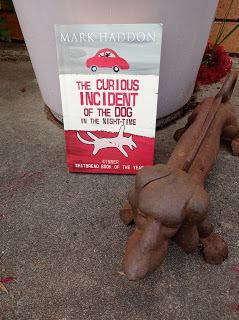
Although gifted with a superbly logical brain, for fifteen-year-old Christopher everyday interactions and admonishments have little meaning. He lives on patterns, rules, and a diagram kept in his pocket. Then one day, a neighbor's dog, Wellington, is killed and his carefully constructive universe is threatened. Christopher sets out to solve the murder in the style of his favourite (logical) detective, Sherlock Holmes. What follows makes for a novel that is funny, poignant and fascinating in its portrayal of a person whose curse and blessing are a mind that perceives the world entirely literally.
MY THOUGHTS:
This book is celebrated as an inventive and original prizewinner with rave reviews, so I grabbed it when I saw it on a free book table, even though I was cautious about a story with a murdered dog. Violence and cruelty to animals is no draw card for me, but at least it's clear this dog is already dead at the start.
Christopher Boone is a 15-year-old who discovers his neighbour's poodle, Wellington, lying dead with a pitchfork through his flank. Grieved and upset because he likes dogs too, Christopher decides to record his process in writing as he tracks down the killer.
Although he's highly intelligent with logic and mathematics, Christopher knows this will be a challenge for him, because he thinks differently from others. He cherishes order above all and can't stand change. He has a photographic memory but can't filter details, so reaches the point of TMI incredibly fast, and has extreme reactions that stretch his carers' capacity skills to the limit. He finds it difficult to relate to others because he can't read their feelings and emotions. And the concept of a sense of humour bewilders him, because the subtlety and nuances of dialogue has always eluded him.
I really wanted to enjoy this read, but didn't quite get there.
Have you ever settled down for a light-hearted evening with one of those movies that are touted as comedies, but end up having some heavy, tear-jerking agenda that depresses you instead? This book let me down in a similar way. It's not that anything is wrong except for misleading advertising. It's irritating when we don't get the story we trust we've committed several hours to. In this case, based on the title, blurb, and darkly comic cover, I expected a whimsical mystery about an Aspy teen who manages to solve a crime by piecing together random clues which other people miss. And I expected they'd be dropped at intervals throughout the story. But what we actually end up getting is a very angsty drama about Christopher and his dysfunctional family, with one melt-down after another from various characters with no satisfying resolution.
So I feel it's fair to warn other mystery enthusiasts at the outset that Christopher finds no actual clues in his sleuthing at all, and Wellington's killer is revealed way early on. I actually guessed who it would be. This book has a small cast of characters so it's not that difficult, but I'd hoped the culprit would come up with a far better excuse! The circumstances and motivation do this person no credit.
Another irritation is Christopher's dismissive attitude toward certain concepts he can't wrap his mind around, which feel like they're coming from the author Mark Haddon as much as from the boy himself. Like several other logic dominated people I've come across, Christopher scoffs at things he can't understand, such as heaven and the supernatural. He ridicules people who choose faith as a guiding factor in their lives, and basically calls them deluded idiots. Anything way off his radar is dismissed as foolish, non-existent, or something that will surely be dissected thoroughly under the microscopes of the future. People like Chris (and I assume Haddon) would surely shake their heads if anyone suggested that a God small enough to wrap our heads around wouldn't be much of a God.
Finally, the main adults in Christopher's life aren't particularly admirable, and often come across as self-focused and unwilling to accept curve balls in their lives without a load of griping. Even his father Ed, who's probably most committed, has issues with instability and poor decision making. I know they're under a lot of stress, but it doesn't make for an enjoyable read.
I'm guessing Mark Haddon's main reason for writing it is to give readers a rare glimpse into the headspace of someone with high functioning autism, so that we can empathise with what they must go through every day. All the puzzled misunderstanding of speech that most others seem to get instantly. The weird looks and rude reactions from people who in turn don't understand that your thinking loops are wired differently. The overwhelming anxiety over stimuli which is pooh-poohed by others but extremely real to you. Based on many other reviews, he pulled it off super successfully, but I still would have preferred it if he and his publishing team had been upfront with all this, rather than leading us to believe it's a mystery story.
It's a highly readable book and full of interesting trivia, so deserves three stars rather than two, but overall, it wasn't my cup of tea.
🌟🌟🌟
The Vince Review
I invite you to treat this blog like a book-finder. People often ask the question, "What should I read next?" I've done it myself. I try to read widely, so hopefully you will find something that will strike a chord with you. The impressions that good books make deserve to be shared.
I read contemporary, historical and fantasy genres. You'll find plenty of Christian books, but also some good ones from the wider market. I also read a bit of non-fiction to fill that gap between fiction, when I don't want to get straight on with a new story as the characters of the last are still playing so vividly in my head. ...more
- Paula Vince's profile
- 108 followers



